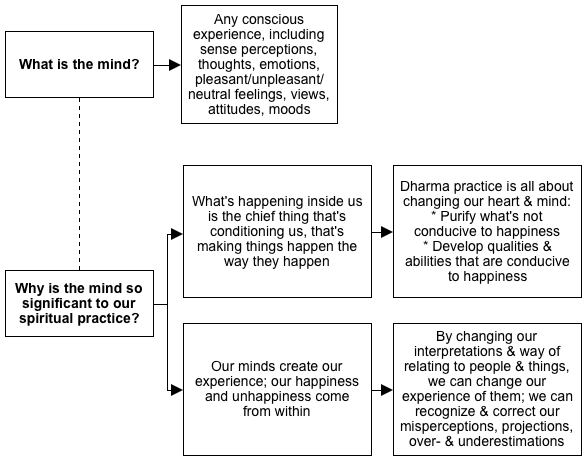Notes
What Is The Mind?
The mind is not the brain, which is a physical organ. In Buddhism, mind refers to any conscious experience, not limited to the intellect alone. Thus mind includes sense perceptions, thoughts, emotions, pleasant/unpleasant/neutral feelings, views, attitudes, moods, etc.
Mind Creates Our Experience
That the mind creates our experience can be understood on different levels.
The "Attitude" Level
Our attitude toward something creates how we experience it. Consider these two examples:
- You go into a room full of strangers. Whether you enter filled with anxiety and fear or excitement and curiosity makes a huge difference, i.e., it tends to become a self-fulfilling prophecy.
- Somebody criticizes you. If you sit & ruminate and critically psychoanalyze the person, this leads to greater & greater unhappiness and perhaps to thoughts of revenge or retaliation. This can cloud your mood & thoughts for a lengthy period of time. On the other hand, if you change your attitude by realizing that the other person was just in a bad mood, you don't take it so personally and don't get miserable.
Though we think we understand when such examples are presented, we still find ourselves trying to change people or rearrange the world around us in order to make ourselves happy. We're still thinking that our happiness comes from outside ourselves. In fact, we need to change what's inside and familiarize ourselves with more positive attitudes. As we do this, people & things will appear differently to us and we will no longer get stuck in the stories we tell ourselves about things we observe on the outside.
We often impute meaning to things that don't have that meaning from their own side. We don't bother to find out if the meanings or motivations we're imputing are correct; we make assumptions, we believe them, and then we act on them. Then we wonder why it's so difficult to communicate and get along with others.
So how we think about things influences how we behave, which then influences how other people react to us.
- We don't look at our mind to see what our preconceptions are and recognize the story we're telling ourselves about the situation.
- We think there's an objective world out there that's like "that" instead of realizing that we've written the story.
- Moreover, over time, we form a very concrete idea of "this is how things are," and then we tend to experience that over & over.
If we just change our attitude, the whole experience changes. Remember this: Moment to moment, we have the ability to change what our experience is.
The "Karma" Level
Karma simply means "actions"—what we think, say, do & feel.
- When we act, there's sort of a remnant of energy that's left that becomes a "karmic seed" or "karmic latency." That influences what we experience later in this life or a future life, as opposed to immediate consequences of actions.
- The actions we do are governed by the mind, i.e., the mind has an intention to do the act.
- We're not always aware of our intentions, so we don't always try to control them.
- We do various things, some with good motivations, some with bad. Either way, they leave latencies in our mindstreams. Later, these latencies ripen and influence the kind of situations we find ourselves in.
- So here's another way our mind creates our experience—by having certain attitudes, motivations & emotions that motivate us to think, speak, or do particular actions, that leave the karmic latencies that ripen at some point in the future.
- So when we ask "Why me?" in particular situations, this is why. There's a link between our actions and the situations we find ourselves in.
- Ex: If you criticize others a lot, others tend to criticize you.
- Ex: If you argue with others a lot, others tend to argue with you.
- If we start changing our motivations & actions, then our external circumstances start to change. We learn to create the karmic causes for positive situations and to avoid creating the karmic causes for negative situations.
- Actions that are largely motivated by clinging attachment, anger, confusion, or other harmful emotions/attitudes bring negative situations & suffering in the future. Actions motivated by generosity, kindness, ethical conduct will bring positive situations & happiness in the future.

